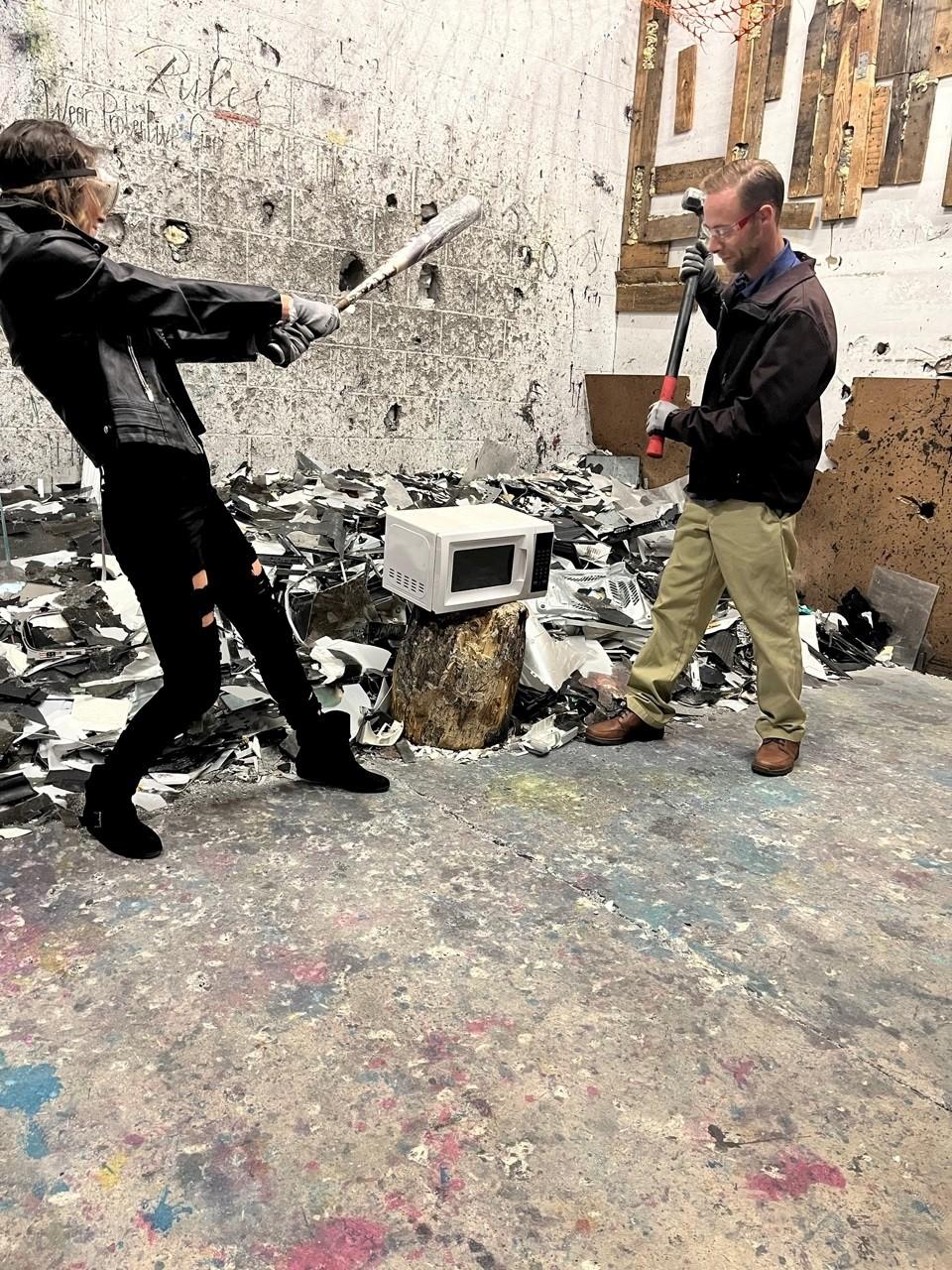
Section Branding
Header Content
Smash away your emotions (as long as it's just for fun) at these Georgia businesses
Primary Content
LISTEN: Rage rooms, also called smash rooms or anger rooms, offer safe spaces to physically vent. But while they are okay for fun, a mental health expert says they're no replacement for therapy in dealing with emotions. GPB's Orlando Montoya reports.

It’s 9 p.m. on a Friday evening and Ansley and John Sukowske have come to a business called Outrage, in Kennesaw, north of Atlanta. Inside a room with cinderblock walls, they wielded crowbars, bats and an eight-pound sledgehammer to break plates, glassware and junk electronics.
“As soon as I hit it, it’s gone," John said, as the volume on a heavy metal soundtrack swells in the background. "I’m going to get out of your way.”
Outrage is one of three rage rooms in Georgia. Also called smash rooms or anger rooms, these businesses offer safe spaces to physically vent. But do they actually improve mental health?
Ansley and John wore safety goggles and gloves as they smashed away. And after a while, they started panting. It’s a bit of a workout to smash so much stuff. Ansley said she doesn’t have rage so much as the normal stress of a stay-at-home mom.
“It definitely would be a fun mom’s night out," she said. "I could see moms, a lot them with breaking plates, not having to worry about them being broken.”
Other customers come in with more specific emotions to deal with. Isabella and Gary Storey said they’re letting out a bit of pandemic-era frustration. Gary bought the session for his wife as an anniversary gift.
“She works at a pharmacy and works with the public every single day — and has for the past three years going through COVID and everything," Gary said. "So having to release a little stress is a good thing.”
“You just think about things that upset you that you’ve got to like suck down in the regular world and you just let it out," Isabella said.
Rage room owner Kevin Torsel said customers open up to him about problems at work, difficult family members and other personal traumas.
“Like deaths in the family," he said. "A lot of times what they do is they come in with Grandma’s old china. And they get to break their grandma’s old china. So, on the china, they’ll write down ‘Oh, I miss my grandma because of this,’ or ‘Rest in peace grandma.’ And then you get to break that stuff and it’s just kind of a way of saying, ‘Ah, I’m letting that go.’”
Torsel sees his rage room as both a business and a mission. He credits smashing plates with helping him deal with anger management issues stemming from his relationship to his father.
“My goal is to help as many people as I can," Torsel said. "I can’t say we’re therapy. But I can say that it’s easier to pick up a bat, in my case, than it is to speak to somebody.”
There’s little research on the therapeutic benefits of rage rooms, axe throwing or other such businesses. Licensed clinic therapist Rueben Darku runs an anger management clinic north of Atlanta. He says rage rooms may work as a fun night out but aren’t good as a long-term solution to serious problems.
“If it is for fun, absolutely, it’s okay, go have fun there," Darku said. "It has to be combined, if you have anger issues, it has to be combined with seeing a therapist to address the root cause of those behaviors.”
Georgia’s newest rage room, Smithereens, opened in Savannah last year. There’s another one, Rekt, in Carrolton. In recent years, rage rooms have been a growing national trend. At Outrage, customers pay $90 for 20-minute sessions. Outrage customers smash about two tons of material every week, stuff Torsel gets on the cheap from junk haulers.
“For example, when you bust a microwave open or an old dryer, there’s motors in them; there’s copper that they can’t really access or have time to get to," Torsel said. "So we actually separate it for them. So that when they come get them, all they have to do is take the scrap with them and it’s a win-win situation.”
He said he follows federal safety rules about what can and cannot be smashed up. Things like older, non-flatscreen TVs and the toxic toner in printers aren’t allowed. Torsel says his 2-year-old business is so good that he plans to leave his suburban location and expand it in higher-rent Atlanta.

